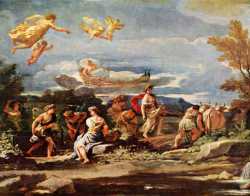Pomona
The Roman divinity of the fruit of trees, hence called Pomorum Patrona. Her name is evidently connected with pomum. She is represented by the poets as having been beloved by several of the rustic divinities, such as Silvanus, Picus, Vertumnus, and others.
Her worship must originally have been of considerable importance, as we learn from Varro1 that a special flamen, under the name of flamen Pomonalis, was appointed to attend to her service.2 It is not impossible that Pomona may in reality be nothing but the personification of one of the attributes of Ops.3
❧
Iconography
Pomona was represented with a carved pruning knife, mainly by painters from the Renaissance and Mannerism periods.
References
Notes
- Varro. On the Latin Language vii, 15.
- comp. Pliny the Elder. Naturalis Historia xxiii, 1.
- Hartung, J.A. Die Religion der Römer. Vol. 2, p. 133 ff.
Sources
- Ovid. Metamorphoses xiv, 632.
- Servius on Virgil's Aeneid vii, 190.
- Sextus Propertius. Elegies iv, 2.21 ff.
- Smith, William. (1870). Dictionary of Greek and Roman Biography and Mythology. London: Taylor, Walton, and Maberly.
This article incorporates text from Dictionary of Greek and Roman Biography and Mythology (1870) by William Smith, which is in the public domain.
